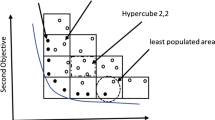
Overview
- Gives in-depth discussion about technical issues of truss structures
- Provides applications of various metaheuristics over structural optimization
- Covers single and multi-objective optimization problems
Part of the book series: Engineering Optimization: Methods and Applications (EOMA)
Buy print copy
About this book
Similar content being viewed by others
Keywords
Table of contents (9 chapters)
-
Front Matter
-
Optimization of Weight, Shape and Size of Structures Using Different Nature-Inspired Metaheuristic Algorithms
-
Front Matter
-
-
Topology Optimization and Design of Structures Under Dynamic Conditions Using Finite Element Methods
-
Front Matter
-
Editors and Affiliations
About the editors
Dr. Ali Sadollah received his Ph.D. from the department of mechanical engineering, University of Malaya, Malaysia, in 2013. He served as a postdoctoral research fellow at universities such as Korea University and Nanyang Technological University. Currently, he is an assistant professor at the University of Science and Culture, Iran. He is among the top 2 percent of the world’s researchers, according to a recent Stanford University study, and the inventor of two metaheuristic optimization methods named as water cycle algorithm and neural network algorithm. His research interests include algorithm development, optimization and metaheuristics, applications of soft computing methods in engineering, computational solid mechanics, finite element method and cold roll forming process. Dr. Sadollah has published 3 books, contributed scientifically to over 100 scientific research and was invited to participate in numerous international and national events.
Bibliographic Information
Book Title: Optimization Methods for Structural Engineering
Editors: Ishaan R. Kale, Ali Sadollah
Series Title: Engineering Optimization: Methods and Applications
DOI: https://doi.org/10.1007/978-981-99-2378-6
Publisher: Springer Singapore
eBook Packages: Mathematics and Statistics, Mathematics and Statistics (R0)
Copyright Information: The Editor(s) (if applicable) and The Author(s), under exclusive license to Springer Nature Singapore Pte Ltd. 2023
Hardcover ISBN: 978-981-99-2377-9Published: 07 June 2023
Softcover ISBN: 978-981-99-2380-9Published: 25 June 2024
eBook ISBN: 978-981-99-2378-6Published: 06 June 2023
Series ISSN: 2731-4049
Series E-ISSN: 2731-4057
Edition Number: 1
Number of Pages: XIII, 225
Number of Illustrations: 28 b/w illustrations, 99 illustrations in colour
Topics: Computational Science and Engineering, Engineering Design, Solid Mechanics, Aerospace Technology and Astronautics



